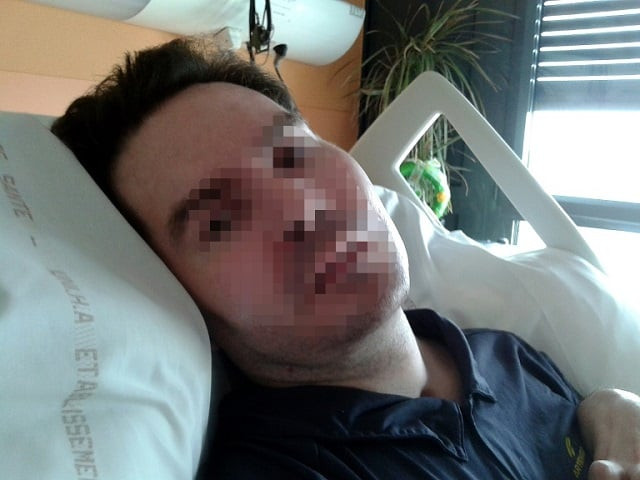Brain-damaged French patient dies after doctors remove life support: family
Vincent Lambert involved in a near-fatal car crash in 2008 that left him a quadriplegic with severe brain damage

Vincent Lambert had been on artificial life support since a near-fatal car crash in 2008. PHOTO: AFP
A French man at the centre of a bitter row over right-to-die legislation passed away in hospital on Thursday more than a week after doctors removed his hydration and nutrition tubes, his family said.
"Vincent died at 8:24 am this morning," his nephew Francois Lambert said, expressing his "relief after years of suffering for everyone".
"We were ready to let him go," he added, saying he had been notified about his uncle's death by the doctor treating him.
Vincent Lambert, 42, was involved in a near-fatal car crash in 2008 that left him a quadriplegic with severe brain damage which doctors had long said was irreversible.
Psychiatrist, psychologist or psychotherapist: Who should you reach out to?
Left in a vegetative state, the question of whether to continue keeping him alive artificially divided his family and the nation, triggering a years-long legal battle that raged in the highest courts in France and Europe.
On July 2, Dr Vincent Sanchez, head of palliative care at the University Hospital in the northern French city of Reims, had begun removing the life support mechanisms in a process which was completed by Wednesday evening.
Although his feeding and hydration tubes were removed, he was kept under "deep and continuous sedation".
Multiple medical assessments ordered by the courts over the years found that the former psychiatric nurse, who was poised to become a father shortly before his accident, had no chance of recovering.
Jean Paillot, a lawyer for Lambert's parents who had fought the move to take him off life support, said it was "now time for a moment of remembrance".
He said they would respond when they felt ready.
The case rekindled a charged debate over France's right-to-die laws, which allow so-called "passive" euthanasia for severely ill or injured patients who are being kept alive artificially with no chance of recovery.
Even Pope Francis got involved, tweeting in May that it was necessary to "always safeguard life, God's gift, from its beginning until its natural end".
Lambert's fate had sparked a years-long battle in the courts with his deeply-Catholic parents and two of his eight siblings, fighting to keep him alive.
But his wife Rachel, his doctors, six other brothers and sisters and a nephew have fought for his right to die, arguing it was the more humane option.
Those close to him said Lambert had repeatedly made clear that he would not want to be kept alive artificially, though this was never put in writing.
But over the years, his parents managed to successfully challenge five different attempts by doctors to halt his life-support.
The last time they tried to do so was in May, but it was quickly overturned by a Paris appeals court.
That ruling was then taken to France's top appeals court, the Cour de Cassation, which on June 28 said doctors could legally end his life support in what was hailed as a definitive final judgement by lawyers for his wife.
With their efforts spurned by the highest courts in France as well as by the European Court of Human Rights, Lambert's parents on Friday filed suit for "murder" with prosecutors in Reims opening a preliminary inquiry.
On July 1, his mother Viviane turned to the UN Human Rights Council in Geneva in a last-ditch plea for help, warning her son was about to "be euthanised because of his mental handicap".
Sugar rush: Too much sweet can be bitter for health
"He is in a state of minimal consciousness but he is not a vegetable," she told the council.
But by Monday, just days after doctors removed his tubes, the couple had accepted that his death was now "unavoidable".
"We have nowhere else to turn and now it's too late. Vincent is dying," they said in a statement through their lawyers sent to AFP, saying that his condition was now "medically irreversible".
In early May, the UN committee on disabled rights also asked France to keep Lambert alive while it conducted its own investigation into his fate, but the government said it was not legally bound to abide by its request.



















COMMENTS
Comments are moderated and generally will be posted if they are on-topic and not abusive.
For more information, please see our Comments FAQ